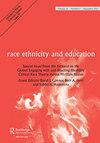Too much talking, not enough listening: the racial contract made manifest in a mixed-race focus group interview
IF 2
2区 教育学
Q1 EDUCATION & EDUCATIONAL RESEARCH
引用次数: 0
Abstract
ABSTRACT In this article, the authors utilize C.W. Mills’ Racial Contract Framework as a tool to unpack how racial power dynamics manifested in a mixed-race focus group interview designed to understand the participants’ insights on race, incarceration, and community. The focus group interview included four research participants: Two White women, one Black woman, and one White man. While the interview was framed as a collaborative, generative discussion, we observed contributions made by the Black woman to be rebuffed or dismissed by the White man, who positioned himself as the expert on the interview topic. The article concludes with implications and recommendations for researchers as they design and enact focus group interviews across racial lines in pursuit of racial justice and equity.说得太多,听得不够:种族契约在一个混合种族焦点小组访谈中得到了体现
在本文中,作者利用C.W.米尔斯的“种族契约框架”作为工具,揭示了种族权力动态是如何在一个混合种族焦点小组访谈中表现出来的,该访谈旨在了解参与者对种族、监禁和社区的见解。焦点小组访谈包括四名研究参与者:两名白人女性,一名黑人女性和一名白人男性。虽然这次采访被设定为一种协作性的、衍生性的讨论,但我们发现黑人女性的贡献被白人男性拒绝或驳回,后者将自己定位为采访主题的专家。文章最后对研究人员在追求种族正义和公平的过程中设计和制定跨种族焦点小组访谈提出了启示和建议。
本文章由计算机程序翻译,如有差异,请以英文原文为准。
求助全文
约1分钟内获得全文
求助全文
来源期刊

Race Ethnicity and Education
Multiple-
CiteScore
6.40
自引率
12.00%
发文量
39
期刊介绍:
Race Ethnicity & Education is an interdisciplinary journal which provides a focal point for international scholarship, research and debate. It publishes original and challenging research which explores the dynamics of race, racism and ethnicity in education policy, theory and practice. The journal has quickly established itself as essential reading for those working in this field and especially welcomes writing which addresses the interconnections between race, ethnicity and multiple forms of oppression including class, gender, sexuality and disability. All articles are independently refereed and the journal is supported by a distinguished international editorial panel.
 求助内容:
求助内容: 应助结果提醒方式:
应助结果提醒方式:


